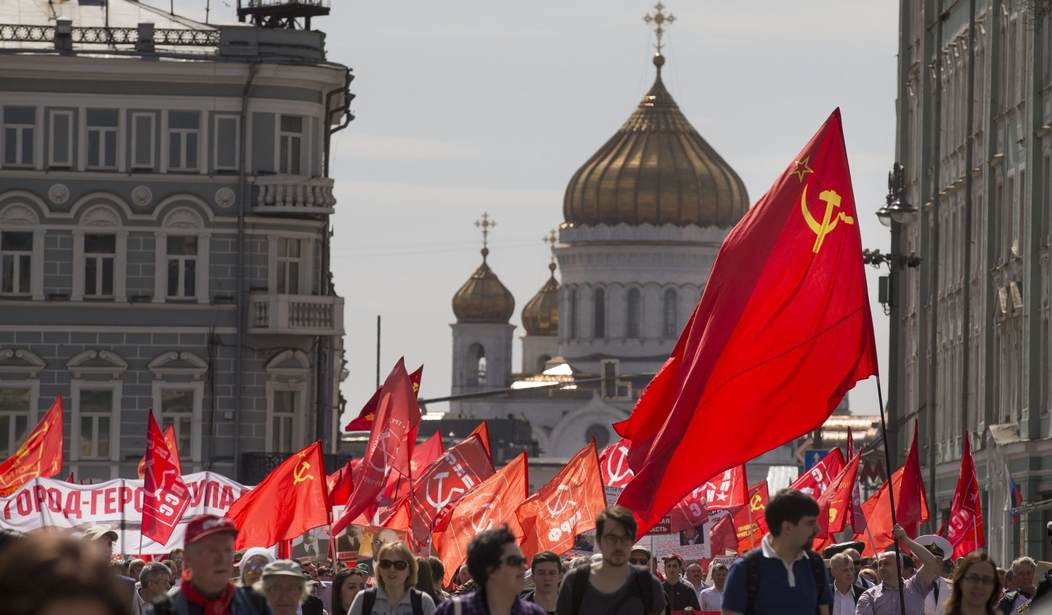The Marxist lie, a toxic combination of juvenile idealism, indolent greed, and an inspiriting sense of social justice, just won’t quit. Alas, the young and the gullible remain the hardest hit. Take Washington Post opinion page columnist Elizabeth Bruenig, for example:
In the United States, we’ve arrived at a pair of mutually exclusive convictions: that liberal, capitalist democracies are guaranteed by their nature to succeed and that in our Trumpist moment they seem to be failing in deeply unsettling ways. For liberals — and by this I mean inheritors of the long liberal tradition, not specifically those who might also be called progressives — efforts to square these two notions have typically combined expressions of high anxiety with reassurances that, if we only have the right attitude, everything will set itself aright.
Hanging on and hoping for the best is certainly one approach to rescuing the best of liberalism from its discontents, but my answer is admittedly more ambitious: It’s time to give socialism a try… I don’t think business-as-usual but better is enough to fix what’s broken here. I think the problem lies at the root of the thing, with capitalism itself.
What, one might well ask, does this highly credentialed 2013 graduate (with honors!) of Brandeis University know about socialism? Who cares!
Capitalism is an ideology that is far more encompassing than it admits, and one that turns every relationship into a calculable exchange. Bodies, time, energy, creativity, love — all become commodities to be priced and sold. Alienation reigns. There is no room for sustained contemplation and little interest in public morality; everything collapses down to the level of the atomized individual.
That capitalism is inimical to the best of liberalism isn’t a new concern: It’s a long-standing critique, present in early socialist thought. That both capitalism and liberal governance have changed since those days without displacing the criticism suggests that it’s true in a foundational way.
Not to be confused for a totalitarian nostalgist, I would support a kind of socialism that would be democratic and aimed primarily at decommodifying labor, reducing the vast inequality brought about by capitalism, and breaking capital’s stranglehold over politics and culture.
All well and good, if structural-Marxist cant is the only language you can speak. But the problem is not the future but the past: socialism/communism cannot work except at the point of a gun, which is the very definition of totalitarianism. Further, there is no way to “decommodify” a commodity, whether it be capital or labor.
More: “inequality” is the proper concern of a religious moral system, not of an economic one. And, finally, if Ms. Bruenig thinks that capitalism has a “stranglehold” over our politics and culture, she must have slept through the Bernie Sanders campaign and just about every social-justice novel, academic paper, and Hollywood movie of the past twenty years.
Besides capitalism itself, which currently pays her salary, her principal outrage seems to be directed at Francis Fukuyama and his premature announcement of the “End of History” (itself a Marxist concept) following the fall of the Berlin Wall and the collapse of Soviet communism in the early 1990s, which posited the triumph of liberal democracies and thus an end to political evolution. This got the goat of every resentful communist and socialist I knew back then, and the seething hostility seems to have been passed down to the next generations as well. What Ms. Bruenig is calling for here is not social justice, but another bite at the apple.
I don’t think that every problem can be traced back to capitalism: There were calamities and injustices long before capital, and I’ll venture to say there will be after. But it seems to me that it’s time for those who expected to enjoy the end of history to accept that, though they’re linked in certain respects, capitalism seems to be at odds with the harmonious, peaceful, stable liberalism of midcentury dreams.
Actually, no. I grew up in San Diego, California, in the 1950s and let me assure you that it was as close to paradise as America ever got, or ever is as likely to get again. The “stable liberalism” she so admires died at the hands of the Left in the mid-Sixties, to be replaced by the neo-Marxists of 1968 and their hideous, second-hand progeny that live on in Antifa and the Bernie Bros today.
I don’t think we’ve reached the end of history yet, which means we still have the chance to shape the future we want. I suggest we take it.
And I suggest we don’t. Because I’ve seen the future up close and personal — in Dresden in 1985, Moscow in 1986, Berlin in 1989 and Moscow again in 1991 — and it doesn’t work.









Join the conversation as a VIP Member